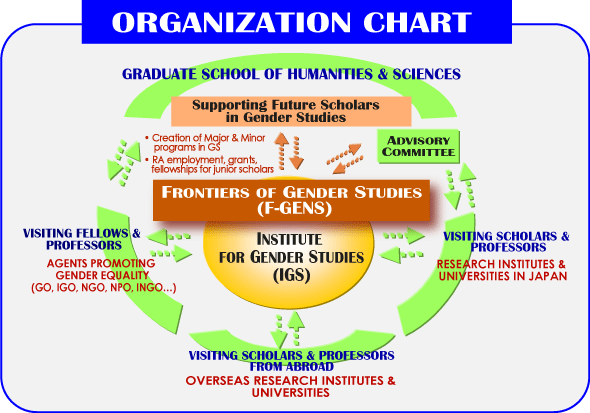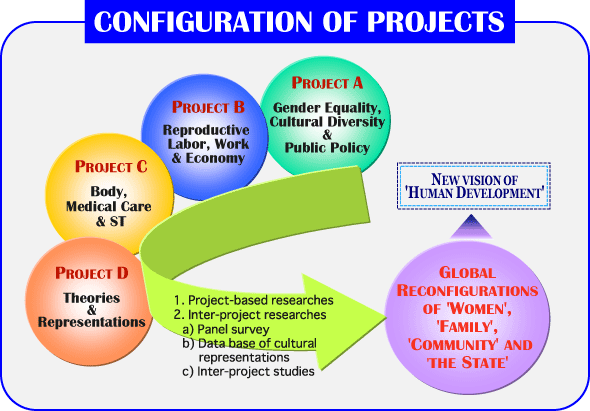Institute for Gender Studies (IGS)
Department of Gender Studies, Graduate School of Humanities & Sciences
The 21st Century COE Program, Ochanomizu University
FRONTIERS OF GENDER STUDIES (F-GENS):
GLOBAL RECONFIGURATIONS OF ‘WOMAN,’ ‘FAMILY,’
‘COMMUNITY,’ AND ‘THE STATE’
About F-GENS
Tamie KAINOU, Program Leader
In July, 2003, “Frontiers of Gender Studies (F-GENS)” was
selected by the Japanese Ministry of Education and Science to receive
a large scale grant establishing it as a COE (Center of Excellence)
program. F-GENS is one of 25 national grantees grouped under the category
of “Interdisciplinary, Combined Fields and New Disciplines”.
According to the Ministry, the 21st Century COE program was established
in order to increase the competitiveness of Japanese universities and
to enhance their role in the international academic community. It is
a great honor that Ochanomizu University was chosen as a site for a
COE program.
The word “gender” or ‘jenda,’ meaning the social
and cultural constructiveness of what is termed ‘men’ or
‘women,’ is still a relatively unfamiliar concept among
Japanese generally speaking. This is not surprising since it takes time
for people to fully appreciate a loanword. What is more surprising is
the tardiness of the concept’s academic recognition. Despite the
fact that the term ‘jenda’ entered the Kojien, a prestigious
Japanese dictionary, as early as 1991, only in 2000 did the concept
find official recognition as a category or, more precisely, a temporary
subcategory of Grant-in-Aid for Scientific Research. Two years later,
in 2002 this category has finally been awarded a permanent status within
the research field of “Combined Fields and New Disciplines.”
This accomplishment owes a great deal to past and present researchers
in women’s studies, feminist criticism and gender/sexuality studies
as well as activists, stateswomen, statesmen, administrators and other
people who have devoted themselves to the realization of gender equality.
The Basic Law on Gender Equality legislated in 1999 also made an important
contribution to recent growing awareness of gender problematics.
Ochanomizu University, a national women’s university founded
originally in 1875 under the name Tokyo Women’s Higher Normal
School, has contributed to this process in recent years most particularly
through the research and educational activities of the Institute for
Gender Studies (IGS) and of the Department of Gender Studies at the
Graduate School of Humanities and Sciences. After IGS’s reorganization
in 1996, numerous national and internationally based scholars and visiting
professors have joined in promoting research and higher education in
fields related to its mission.
The institutional base of gender studies in Japan, however, is as yet
far from being fully developed. Out of 649 universities, there is still
none that offers an undergraduate program in women’s studies or
gender studies. Also, to our knowledge, of 346 universities with doctoral
programs, there are only three - including our own - where students
can work toward a post graduate degree. This institutional deficit is
all the more acutely felt as Japanese society is currently experiencing
profound structural changes, including the aging of the society, internationalization,
the fragmentation of labor markets, rapid introduction of new technologies
(biotechnologies, informational and communicational technologies, etc.),
all of which profoundly impact the gender configuration. These changes
must be studied from a gendered perspective, so that the conditions
necessary to create a society where gender equality and the individual
diversity are both respected can be adequately spelled out.
With 16 regular members and over 50 associates and collaborators, including
scholars from abroad, F-GENS aims to commit itself to just such an endeavor.
The program will be put into effect over a period of five academic years,
2003-2007. Through its activities (cf. Program outline), we seek to
explore the frontiers of gender studies, promoting close exchanges and
collaborations with our counterparts in Asia as well as in other parts
of the world. It will be our greatest pleasure to see our program truly
contribute to the international effort for the advancement of gender
studies.
Tokyo, 16 October 2003

PROGRAM OUTLINE
F-GENS’s program seeks to reexamine impending domestic and global
issues from a gender perspective, thereby establishing at our university
an academic frontier of gender studies. Our investigative project is
rooted in the historical experience of Japan and Asia and is consequently
intended to contribute to the advancement of gender equality within
and outside of Japan.
The following four projects are the constituent parts of F-GENS:
Project A Gender Equality, Cultural Diversity & Public Policy
Project B Reproductive Labor, Work & the Economy
Project C Body, Medical Care, Science & Technology
Project D Theory & Representation
Working in close collaboration, scholars in each of the four projects
will pursue a common, overarching sociopolitical and cultural analysis
of modern gender formation in order to reconfigure “woman,”
“family,” “community,” and “state,”
and ultimately to open a new perspective on “human development”.
Our objective is to present to local as well as the central government
new gender-conscious policy proposals for use and implementation. To
this end, F-GENS is committed to improving the research environment
for future generations of scholars in gender studies and to training
researchers, administrators, and citizens accredited to work in these
related fields.
Objectives
Our program objectives include the following:
1. innovation of a gender studies rationale that responds to issues
imminent in the globalizing world;
2. highlighting an inter-disciplinary gender studies that can rethink
aspects of pre-established disciplinarity in light of the findings of
gender studies;
3. the invention of a gender studies that is the consequence of inter-Asian
dialogue and is rooted in the historical experience and systems of thought
current in this part of the world;
4. and finally, the establishment of an inter-Asian network of gender
studies that can facilitate exchange of scholars and contribute to the
promotion of future generation of scholars.
To achieve these objectives our plan calls for enhancing on-campus collaboration
between Ochanomizu University’s Institute for Gender Studies and
the Graduate School of the Humanities and Sciences. This restructuring
will promote multilateral and systematic research in the new discipline
of Gender Studies and will form a firm basis for pursuing an academic
Asian network in gender studies through various channels with elite
universities and research institutes in the region.
Research Plans
In the year 2003, we have committed to the following agenda:
1. establishing a research framework as well as an organizational environment
for each of the four projects;
2. involving the larger project as a whole in the effort to design a
database of cultural representations and historical materials on gender
and modernity;
3. to launch the pilot for our planned macro scale panel surveys on
gender equality in selected countries in Asia;
4. to convene an inter-project symposium, “Perceptions of Asia
and Gender,” with the intent of facilitating firm linkages among
campus research projects;
5. creating a support systems for junior scholars and graduate students;
6. launching the F-GENS website as a means of disseminating our results
and information globally and
7. establishing an international advisory committee composed of prominent
scholars.
Our plan for 2004 calls for work to continue in each of the four sub-projects
as well as heightened attention to the inter-group tasks of the database
on cultural representations and the panel surveys. This year we will
also convene a symposium with the objective of sharing the sub-groups
findings with the larger Project research community. We will initiate
the Advisory Committee’s first program review of our achievements.
On the basis of the Committee’s findings and our own evaluation
of our progress we will review and map out the second stage of our project.
We project that the years 2005 and 2006 will be spent pursuing inter-project
activities and finely focused sub-project level research programs. Furthermore,
three kinds of symposia organized to produce (1) interim report, (2)
inter-disciplinary dialogue, and (3) a policy proposal will be held.
These symposia are expected to consolidate the four research projects
into a coherent whole.
The final year of the project is devoted to summing up our five-year
research and producing outcomes in the form of publications.

Educational Plans
To support the students and junior scholars, the following programs
will be launched. These programmatic steps are intended to encourage
broad participation of junior researchers, administrators, feminist
activists working in NPOs or NGOs, teachers, juridical officers, and
journalists and to renew their skills:
1. call for applications for research grants in gender studies;
2. workshops organized by and for junior scholars and researchers;
3. expand the number of research assistantships available as a means
of fostering new research;
4. encouraging junior researchers to participate in faculty research
projects at each phase (planning, implementation, and evaluation);
5. hosting overseas students and visiting scholars, as well as expanding
exchanges with overseas research institutes and universities;
6. encouraging students to engage in overseas research and preparing
students to give research papers in foreign language fora.
Program Members
Tamie KAINOU, M.A., Program Leader, Project
Leader for Project A, sociology of law, feminist legal studies, Professor,
Graduate School of Humanities & Sciences, Ochanomizu University
Ruri ITO, Ph.D., sub-leader for Project A, sociology, ethnic
& migration studies, Professor, Institute for Gender Studies, Ochanomizu
University
Keichi KUMAGAI, M.A., Project A, Oceania area studies, Associate
Professor, Graduate School of Humanities & Sciences, Ochanomizu University
Mariko ADACHI, M.A., Project A, feminist political economy,Associate Professor, Institute for Gender Studies, Ochanomizu University
Nobuko NAGASE, Ph.D., Project Leader for Project B (for 2003),
labor economics, social policy, Associate Professor, Graduate School
of Humanities & Sciences, Ochanomizu University
Michiko MIFUNE, M.A., sub-leader for Project B (for 2003), domestic
sciences, home economics, Professor, Graduate School of Humanities &
Sciences, Ochanomizu University
Isao MIZUNO, Ph.D., Project B, economic geography, Associate
Professor, Graduate School of Humanities & Sciences, Ochanomizu University
Eiko SHINOTSUKA, Ph.D., Project B, feminist economics, Professor,
Graduate School of Humanities & Sciences, Ochanomizu University
Kaoru TACHI, M.A., Project Leader for Project C, women’s / gender
studies, Professor, Institute for Gender Studies, Ochanomizu University
Hiroko HARA, Ph.D., Project C, cultural anthropology, Adjunct
Professor, Institute for Gender Studies, Ochanomizu University (Professor,
University of Air)
Azumi, TSUGE, Ph.D., sub-leader for Project C, medical anthropology,
Visiting Professor, Institute for Gender Studies, Ochanomizu University
(Professor, Meiji Gakuin University)
Emiko NAMIHIRA, Ph.D., Project C, medical anthropology, Director,
Institute for Gender Studies; Professor, Graduate School of Humanities
& Sciences, Ochanomizu University
Kazuko TAKEMURA, Ph.D., Project Leader for Project D, critical
theory, Anglophone literature, Professor, Graduate School of Humanities
& Sciences, Ochanomizu University
Chika AMANO, Ph.D., sub-leader for Project D, history of European
arts, Associate Professor, Graduate School of Humanities & Sciences,
Ochanomizu University
Michiko ISHIZUKA, M.A., Project D, Caribbean area studies, Professor,
Graduate School of Humanities & Sciences, Ochanomizu University
Satoko KAN, Ph.D., Project D, modern Japanese literature, Associate
Professor, Graduate School of Humanities & Sciences, Ochanomizu University
Contact Address
Frontiers of Gender Studies (F-GENS)
The 21st Century COE Program, Ochanomizu University
2-1-1 Otsuka Bunkyo-ku
Tokyo 112-8610 Japan
Tel. +81-3-5978-5547
Fax. +81-3-5978-5548
email f-gens@cc.ocha.ac.jp
[Note] F-GENS would like to thank Professor Tani E. Barlow for her contribution during the revision of the text.




